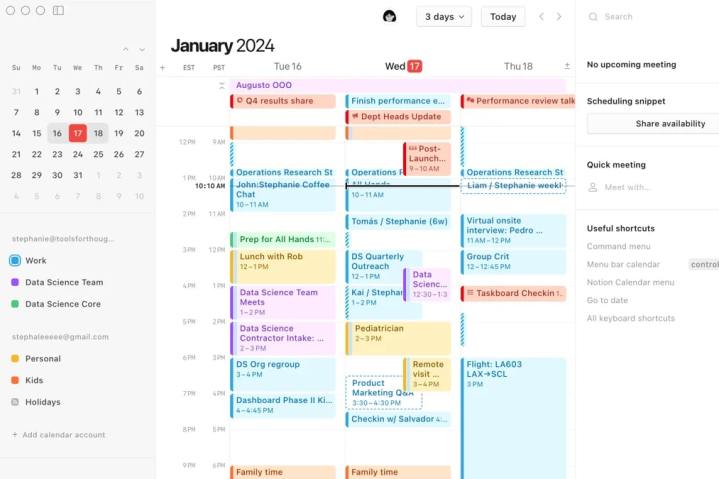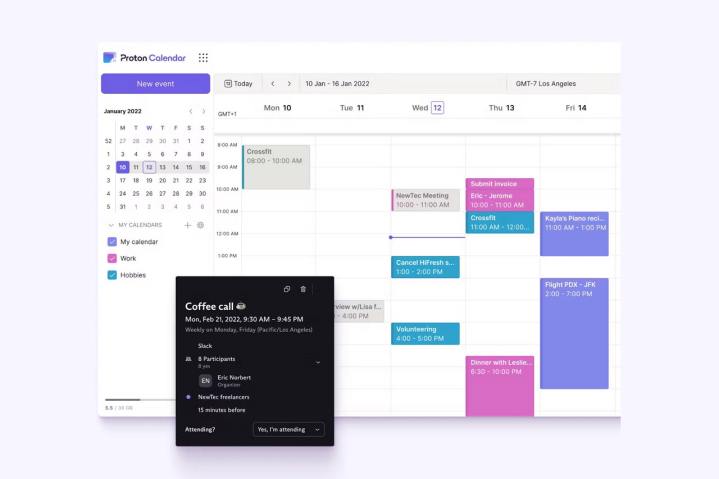Microsoft has just redesigned its Outlook email app, and it’s fair to say that the change has made some people unhappy. But Outlook covers more than just email — it’s got a built-in calendar too, and Microsoft’s plan is to ditch the existing Mail and Calendar apps for Windows and merge them both into Outlook. That means that anyone switching away from the email app also needs a new way to manage their schedule.
That’s where our guide comes in. We’ve found five of the best Outlook alternatives you can get your hands on, and they run the gamut of features and philosophies, from privacy-minded options to those that are built for productivity. Whatever you need, chances are you’ll find it below.
Notion Calendar

Notion is well known as an all-in-one productivity suite that lets you create boards, tasks, lists, databases, wikis, and so much more. It’s also got a very capable calendar, and it’s downloadable as a standalone app for Windows, macOS, iOS and Android.
The Notion Calendar is built for collaboration, making it well-suited to teams or remote workers. Once you’ve set your availability, other users can book in a meeting without needing to bug you with messages. It hooks up with apps like Google Calendar and Zoom, so you can easily work with whatever your organization provides. And its beautiful design makes understanding your day easier than ever.
The Notion Calendar comes with some clever extras, too. You can see your day’s schedule right from the menu bar in macOS, for example, and drop multiple time zones into your calendar to see what time it is wherever your co-workers live. And it’s well integrated with the rest of the Notion suite, so you can create Notion documents from the calendar or plug them directly into your schedule. All that makes it a solid Outlook alternative, whatever your needs may be.
Mozilla Thunderbird

Like Outlook, Thunderbird is primarily an email client that also has strong calendar functionality. But this isn’t just an app where the calendar is a half-baked second thought — Thunderbird’s calendar is a key part of its overall offering.
Because it’s part of an email app, it’s incredibly easy to take schedules from your messages and add them right into Thunderbird’s calendar. It also makes managing your day’s task lists and updating your contacts far simpler than if you had to do so across multiple apps.
One of the best parts about Thunderbird is its tight integration with third-party apps and plug-ins. You can attach files to your appointments with Box or Dropbox, work with Outlook and Google Calendar events, convert your tasks to a kanban-style board, and a lot more. There’s a whole community of developers creating add-ons for Thunderbird, so there’s always something new to try.
Of course, Thunderbird offers a strong email suite as well. And because it’s made by Mozilla, it’s guided by the same principles that have shaped the company’s Firefox browser: Thunderbird is free, open source and built around privacy and security.
Proton Mail

Many apps and services know far too much about our private lives, and that’s never truer than when we’re talking about our daily schedule. Proton Mail helps keep your timetable private, as it contains a built-in calendar with all the same protections that you’d expect from a company like Proton.
The calendar interface is attractively designed and easy to navigate, while adding and editing tasks takes just a couple of clicks. It’s ease of use proves that protecting your privacy need not be hard work.
Everything is end-to-end encrypted, meaning no one can see your details — not advertisers, not governments, not even Proton. And it ties in well with Proton’s other products, allowing you to add events to your calendar right from your Proton Mail inbox, for example.
Any.do

Any.do is designed first and foremost as a to-do list app, but anyone who has spent time managing their tasks knows that understanding your upcoming schedule is a key part of staying on top of things. To that end, Any.do includes a built-in calendar, and it makes for an excellent Outlook alternative.
The clean, intuitive interface and powerful features make it a great way to view your upcoming events without the hassle of some rival products. And it’s not just for keeping your personal schedule under control — Any.do’s calendar is well-suited to teamwork, too. For instance, you can assign tasks to your colleagues or leave notes explaining what you need from them, while shared attachments can be uploaded so everyone knows what they’re working with.
We also appreciate that you can customize Any.do to your taste and way of working. Anything from the app’s colors and layout to its notification rules can be tweaked as needed, ensuring it works for you, not the other way around.
Google Calendar

We’d be remiss not to include Google Calendar, as it’s a hugely popular Outlook alternative that offers a raft of high-quality features. Give it a try and you’ll quickly see why so many people use it.
Events can be dragged and dropped to a new time and shrunk or expanded with a quick click and pull. You can run multiple calendars at once and see them in the same view, plus share calendars with friends and colleagues so that everyone is on the same page.
We also like how well it works with other Google services. Scheduled video calls can be hosted on Google Meet, while it can also be used as a to-do list with events that you check off as they’re completed. And it’s smart enough to automatically add things like concerts, flights, and sporting events to your calendar if they show up in your email.
Google Calendar is a highly flexible app, as it can run on Windows, macOS, iOS, and Android, as well as in a web browser, so you should be able to stay on track no matter where you are or what device you’re using.




